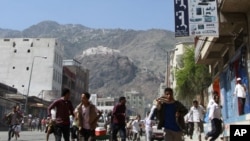European Union foreign policy chief Catherine Ashton has renewed her call for Yemen's president to give up power. The United Nations says more than 50 people have been killed in demonstrations since Sunday in Yemen's southern city Taiz.
Ashton said what she called the “continued repression by the Yemeni regime” cannot be accepted. Those responsible for human-rights abuses must be held accountable, she said.
The United Nations human-rights office says more than 50 people have been killed in demonstrations in the southern Yemeni city Taiz, and it believes hundreds more have been injured.
In the capital, Sana'a, a fragile truce made Friday between tribal groups and those loyal to the government broke down. Clashes were reported between forces loyal to President Ali Abdullah Saleh and those loyal to a top tribal leader, Sheikh Sadiq al-Ahmar.
Yemen expert Chris Davidson, of Britain’s Durham University, says it is likely the violence in Yemen will escalate, despite calls from the international community.
"I think we are beyond the point now where any regional or international actor is going to get the president to stand down peacefully. I think we are looking at a Libya or a Syrian-style situation here," Davidson said.
President Saleh is facing widespread opposition to his 33-year rule, but has ignored calls from home and abroad to stand down.
Gulf Research Center Security and Terrorism Studies Director Mustafa Alani says a civil war in Yemen is not favored by Saleh or his opponents because neither side thinks it would be a winnable war.
"No party thinks that they can win this war. Regionally again, it is going to cost a huge destabilization. And for the international community and U.S., al-Qaida and terrorist groups are going to take advantage of civil war and establish themselves. So civil war is one reality on the ground, but it is not favored by any party in this struggle," Alani said.
He says Saleh will not step down until he can ensure that he will be able to play a continued role in Yemen’s politics. He says Saleh wants to make sure he and his family will have immunity and that he can join the parliament.
Alani says Saleh thinks he is in a strong position because the opposition is weak. "The opposition by the way is not trusted by the people and not trusted on the regional level. So this is what maintains the position of the presidentm," Alani said.
Suspected al-Qaida fighters reportedly killed six Yemeni soldiers Tuesday in the southern city of Zinjibar.
EU Chief Renews Call for Saleh to Step Down




